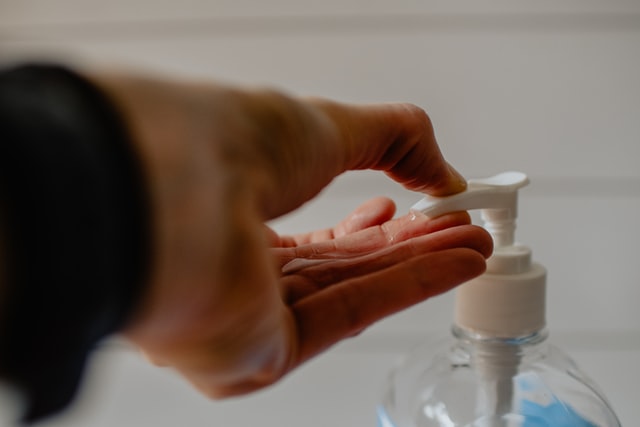18 May 2021
NHS decontamination expert Tony Sullivan explores the importance of proper education in cleaning practices, including standardisation, auditing services, and training.
Sullivan is the Environmental and Decontamination Services Manager for the NHS Deep Cleaning Advisory Service. As a board member for the Institute of Decontamination Sciences, the professional body for decontamination in the UK, Tony Sullivan brings a wealth of experience and knowledge in the field of decontamination.
Following 23 years’ service as an engineer in the Royal Air Force, Sullivan decided to change the direction of his career and in 2013 graduated with a degree in Decontamination from Kingston University. Since then, he has managed the decontamination services for a number of NHS Trusts in the North East, prior to joining the NHS Deep Cleaning and Advisory Service in August 2020.
Is Your Cleaning Company Investing Enough in Training?
From the recent global coronavirus pandemic and the 2002-2004 SARS epidemic, to localised norovirus outbreaks, we have never been more informed on the role cleaning plays in stopping the spread of infection.
Contracted cleaning companies play a hugely important role in this. They are vital in undertaking deep cleaning processes to ensure that our public spaces - from office buildings to shops, restaurants to theatres – are safe and hygienic environments. They are also often a much more cost-effective way of undertaking cleaning processes, as many businesses continue to deal with the financial implications of the pandemic.
This is why it’s extremely important for cleaning companies up and down the country to have as much support and guidance as possible, as there are still many cleaning myths out there. From using products that claim to kill coronavirus for 30 days after application, to not knowing the common touchpoints in a building, misinformation can spread as fast as the viruses we are trying to protect people from.
For businesses that are welcoming back their staff and the general public, we have a responsibility to get this right. So, how do organisations know they have received a high standard of cleaning? And how can we bolster the already valuable work of our cleaning contractors?
This is where standardisation, auditing and assurance services, and training comes in.

Picture: a photograph of Tony Sullivan
Standardisation
Anyone looking to buy bleaches and other disinfectants should check that the product uses registered chemicals, to ensure they will not be harmful to human health, and can actually deliver the level of disinfection they claim.
Additionally, disinfectant only protects a surface or room against coronavirus until the next person walks into the room or touches the surface, and then immediately the integrity of the room is compromised. Regardless of product or company claims, a one-off deep clean cannot keep surfaces free of coronavirus for, say, 30 days. Organisations should instead be investing in a service that helps them maintain a certain standard of cleanliness.
Standardising both the cleaning processes and the materials used by cleaning companies would not only help reassure business owners and the public, but also the cleaning companies themselves that their processes are of a consistently high standard.
.png)
Audit and Assurance
To understand where the key challenges are in the first place, an audit is an essential way of measuring this. As you may be aware, audits are thorough investigations which can catch easily-overlooked areas that are not being cleaned properly, but they can also provide essential assurance to businesses and organisations that their spaces are clean and safe for the people in them.
Risk assessments allow for the creation of bespoke environmental management plans, while also reviewing Control of Substances Hazardous to Health procedures, the quality of work, suitability of current cleaning equipment and the standard of the previous training undertaken by the cleaning team.
Training
Education is always the best place to start when it comes to best practice. Key areas, such as: the application of cleaning solutions; optimum touchpoint cleaning; the wearing and disposal of PPE; and effective disinfectants, are just some of the areas where common mistakes can be made, which could have a huge bearing on the health of those in the premises.
While audits are essential in understanding what work has been done before, training will ensure that practices are aligned going forward.
For the first time in England, the Royal Society of Public Health has accredited a training course for domestic cleaning, which is provided by the NHS Deep Cleaning and Advisory Service. The Service continues to work with a number of local and UK-wide cleaning and facilities management companies to provide the accredited training ahead of deep cleaning services being delivered.
In practice, this has been invaluable to many contracted cleaning services. Wetton Cleaning Services Ltd is a nationwide cleaning and support services company which chose to undertake the training offered by the NHS Deep Cleaning and Advisory Service. Not only did this strengthen their Coronavirus Sanitising and Prevention Cleaning offering, it was another way of reassuring their clients in the quality and high standards of their service, as they welcome back staff and users.
If we continue to elevate the standard of domestic cleaning in public spaces across England, we will help reduce the number of hospital admissions from bacterial and viral diseases and will be better prepared to manage infection outbreaks in the future.
Picture: a photograph of someone using hand sanitiser
Article written by Tony Sullivan | Published 18 May 2021
Share
Related Articles
NHS Trials “Unique” New Decontamination Tech to Reduce COVID Transmission Indoors
The NHS is trialling a new technology solution which claims to replicate the science of outdoor air in indoor spaces.
Airora Professional, developed by PA Consulting...
Read Full Article
Eight Nightingale Hospital Hubs Planned
Temporary hubs at hospitals across the country are being set up to help with potential admissions surges due to the omicron variant.
These structures are able to...
Read Full Article
IMechE Develops Regulatory Standard for UV Air Cleaners for NHS
A solution to remove COVID-19 from the air using UV sanitisers will soon be used in hospitals, after a team led by engineers from the Institution of Mechanical Engineers...
Read Full Article
Sodexo Launches Infection Prevention Programme for Hospitals
With an aim to reducing preventable infections in hospital settings, Sodexo is launching Protecta, an evidence-based infection prevention...
Read Full Article
NHS Deep Cleaning Service Supports Sue Ryder Hospices
The new NHS Deep Cleaning and Advisory Service is enforcing a new national standard for domestic cleaning.
Sue Ryder is amongst the first healthcare providers in...
Read Full Article
Public Health to be Transformed With Formation of Two New Bodies
The Health Estates and Facilities Management Association is encouraging feedback on a recent proposal to overhaul England’s public health with the formation of two...
Read Full Article
ALFA Eco Tech Launches “Mechanical Solution” to Virus Transmission
CoviX101 is a non-toxic product that claims to use molecular nano spikes to kill microorganisms.
Developed by ALFA Eco Tech, when CoviX101 is applied to a surface it...
Read Full Article
Are Offices a Greater COVID Risk Than Supermarkets and Restaurants?
Data from Public Health England suggests that office environments have had more COVID outbreaks than other workplaces.
Figures obtained by the BBC 5 Live...
Read Full Article
BICSc Launches NHS Compliant Cleaning Skills
The British Institute of Cleaning Science has announced the imminent launch of a selection of NHS compliant cleaning skills, which have been adapted from the...
Read Full Article
Controlling Infection on Touchpoints With Antimicrobial Technology
As a direct result of the COVID-19 pandemic, keeping touchpoints in any building clean and safe has taken on an urgent significance in 2020.
Despite UK...
Read Full Article


.gif)

.gif)

.gif)



.png)



.png)

.png)
